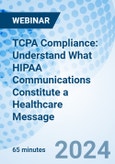Examine communication rules, frequency, patient preferences, and honoring communication permissions in practical detail.
How much communication is too much and how much is too little when reaching out to your patients and their responsible parties? To answer this straightforward question, healthcare organizations are expected to separate and earmark particular proposed communications based upon purpose to stay aligned with several laws. A handful of federal laws map different rules for assuring that both the method and frequency with which you communicate with your patients (and their responsible parties) is consistent with your patients’ expectations and permissions. Under Federal Communication Commission (FCC) rules, different types of HIPAA communications are now treated differently. In addition, under the Federal Trade Commission (FTC) rules – any uses or disclosures made of patients’ non-public information that are not expressly permitted by consumers could even be viewed as a healthcare breach because of the unauthorized access. Finally, the U.S. Department of Health and Human Services (HHS) who administers HIPAA – may have its own perspective on what permissions you must have to communicate with patients and their responsible parties. In this presentation we will take a practical look at all of these rules and guidelines for how to communicate, how often to communicate, and how to learn and honor your patients’ communication permissions and preferences.
Learning Objectives
- You will be able to define the various categories of HIPAA communications and distinguish which may occur and with what frequency without running afoul of the TCPA.
- You will be able to describe what a valid patient’s consent must include to meet the TCPA’s standards.
- You will be able to discuss some practical strategies for learning patients’ communication preferences and honoring them.
- You will be able to explain why all types of HIPAA communications with patients are not treated the same way and why it is always important to seek to document patients’ communication preferences.
Agenda
Speakers

Leslie Bender, CIPP/US, CCCO, CCCA, IFCCE,
BCA Financial Services- Chief strategy officer and general counsel for BCA Financial Services, Inc., a Miami, Florida headquartered revenue cycle management company
- An articulate corporate executive with more than 30 years of experience handling compliance, regulatory, transactional and legal matters for hospitals and financial services companies
- Recognized as a national expert on HIPAA and other information privacy and security laws, she was one of the first privacy officers internationally accredited as a Certified Information Privacy Professional
- In addition to being an attorney and government/regulatory relations specialist, she is an experienced mediator
- Frequent motivational speaker and compliance educator and has been honored for her contributions to the consumer financial and health care industries by several credit, collections, health care and banking associations as well as the U.S. Small Business Administration
- J.D. degree, University of Notre Dame; undergraduate degree, Northwestern University
Who Should Attend
This live webinar is designed for medical records directors, health information directors, business managers, office managers, nurses, hospital administrators, billing managers, release of records professionals, compliance managers and attorneys.









